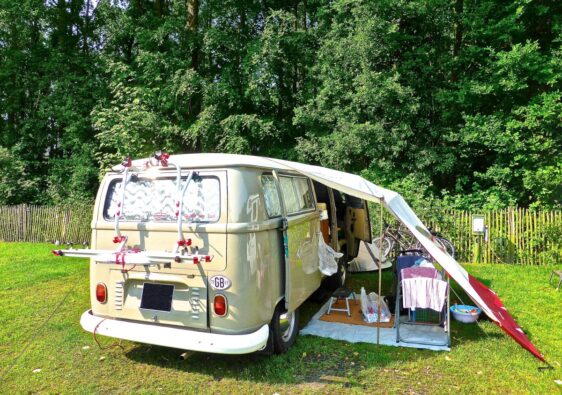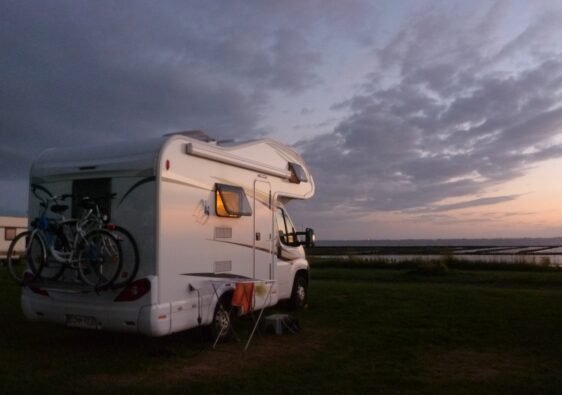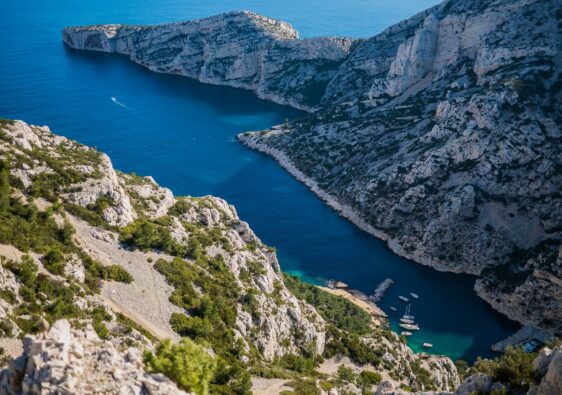Gastronomic, historical, cultural, natural… What if you wanted to see (almost) everything during your two-week stay in France? North, south, big cities and smaller ones, so you can see the real France without getting stuck on the image of a single city. It’s hard to get organized if you know little or nothing about France, so we’ve come up with an itinerary to help you get around in 2 weeks.
This trip can be made by public transport (train, bus) or with a tour operator, but the best solution is to rent a car. It’s possible to find rentals for less than €30/day from Paris on this type of comparator. Check with your dates.
Your 2-week France itinerary at a glance :
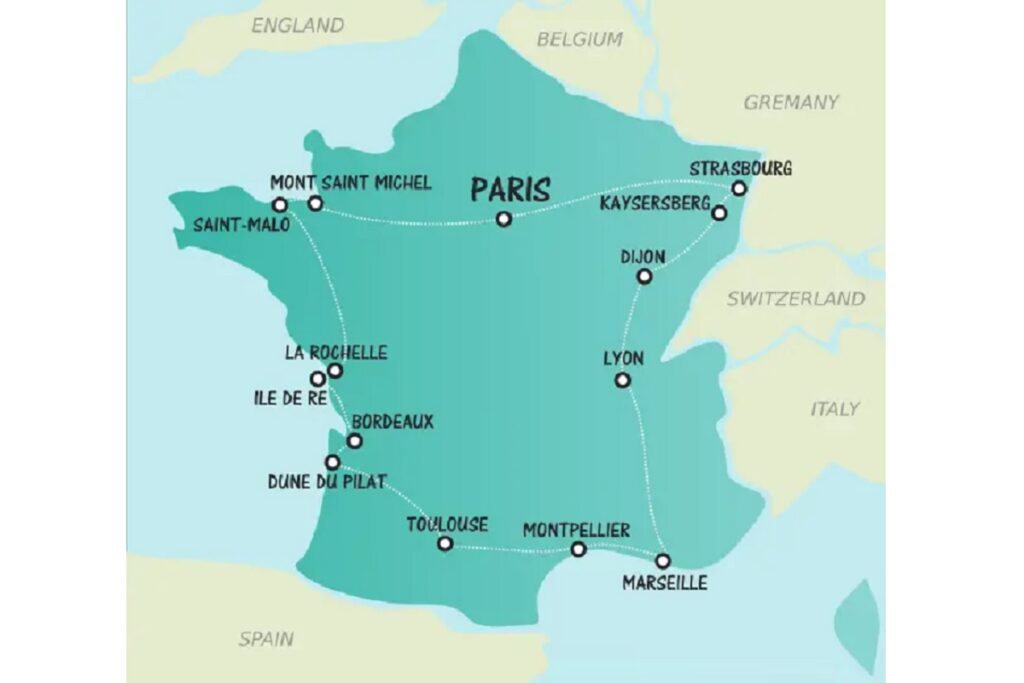
- Day 1: Arrival in Paris, overnight in Paris
- Day 2: Sightseeing in Paris, overnight in Paris
- Day 3: Leave for Mont Saint-Michel, visit, depart for Saint-Malo, overnight in Saint-Malo
- Day 4: Sightseeing in Saint-Malo, depart for La Rochelle, overnight in La Rochelle
- Day 5: Visit Île de Ré, overnight in La Rochelle
- Day 6: Sightseeing in La Rochelle, depart for Bordeaux, overnight in Bordeaux
- Day 7: Sightseeing in Bordeaux, travel to Toulouse, overnight in Toulouse
- Day 8: Sightseeing in Toulouse, travel to Montpellier, overnight in Montpellier
- Day 9: Sightseeing in Montpellier, depart for Marseille, overnight in Marseille
- Day 10: Sightseeing in Marseille, travel to Lyon, overnight in Lyon
- Day 11: Sightseeing in Lyon, overnight in Lyon
- Day 12: Travel to Dijon, visit, overnight in Dijon
- Day 13: Travel to Kaysersberg, sightseeing, depart for Strasbourg, overnight in Strasbourg
- Day 14: Sightseeing in Strasbourg, overnight in Strasbourg
- Day 15: Return to Paris
Your 2-Week France Itinerary Overview: Day-by-Day Travel Plan
Paris (2 nights)
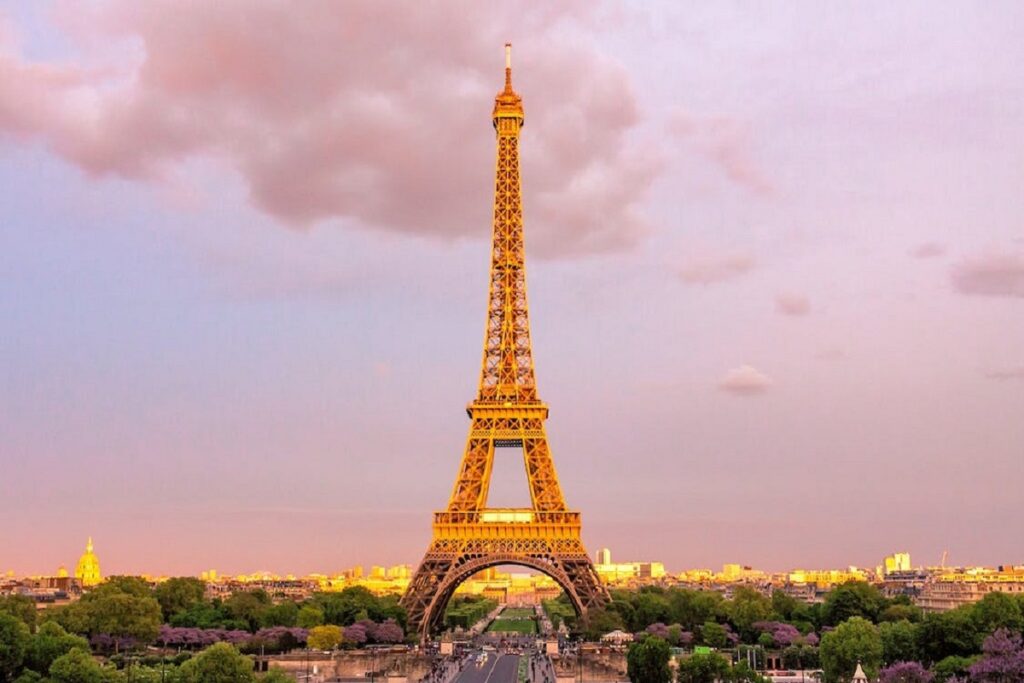
To kick off your two weeks in France, Paris seems like the best place to quickly soak up the French atmosphere. These two nights won’t be easy if you want to see as much as possible, but it’s worth it. The first day you’ll be in top form, so start with the tourist monuments: the Eiffel Tower, the Trocadero, the Arc de Triomphe, Place Vendôme, the Louvre Museum and Place de la Bastille. The next day, you’ll want to visit the touristy but quieter districts of Saint-Germain, Montmartre and the Marais. As you stroll along, you’ll come across a number of brasseries and troquets where you can enjoy a French-style meal.
🛏️ Compare and book hotels in Paris
🚆Train journey: Paris – Pontorson (3h37)
🚘By car: Paris – Mont Saint-Michel (4h)
🚆 Check Train Schedules & Prices
🔗 Read Also: Explore Paris in 3 Days: Your Complete Itinerary and Tips
Mont Saint-Michel (Stopover)

Like a small island, Mont Saint-Michel is in the English Channel, accessible either on foot or by bus (best avoided by swimming). It’s one of France’s most visited tourist attractions, so don’t miss out. To reach it, it’s best to take a guide and cross the bay to the Mont. There you can stroll along the water’s edge, visit the abbey, and dine on local specialties at La Mère Poulard restaurant. Events are often held here, mainly religious. If you prefer to enjoy Mont Saint-Michel without too many people, try to avoid these days and come early in the morning.
🛏️ Compare and book hotels in Mont-Saint-Michel
🚆Train journey: Pontorson – Saint-Malo (52min)
🚘By car : Mont Saint-Michel – Saint-Malo (1h15)
🚆 Check Train Schedules & Prices
🔗 Read Also: Visit Mont-Saint-Michel: complete guide
Saint-Malo (1 night)

On your tour of France, stop off at Saint-Malo, one of Brittany’s largest port cities. There’s less hustle and bustle than in the capital, but after the hustle and bustle of Paris, a rest by the sea won’t do you any harm. Everything is designed to make you feel at ease and relax, from beaches and swimming to shopping and thalassotherapy. For a bit of culture and history, you can visit the fort of Saint-Malo and its ramparts, as well as the 39-45 memorial. Brittany is also famous for its gastronomy, so after your relaxation or sightseeing, let yourself be tempted by a galette, a crêpe and a glass of cider.
🛏️ Compare and book hotels in Saint-Malo
🚆Train journey: Saint-Malo – La Rochelle (7h16)
🚘By car : Saint-Malo – La Rochelle (4h30)
🚆 Check Train Schedules & Prices
🔗 Read Also: Best Things to do in Saint-Malo
La Rochelle (2 nights)
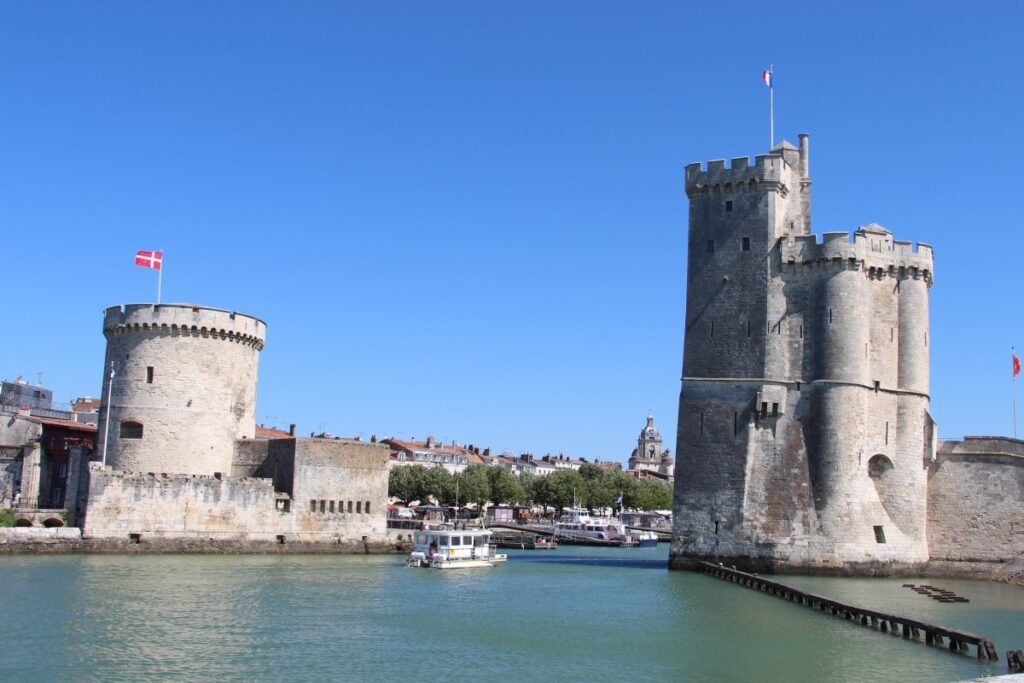
Another city by the sea, La Rochelle is historic, urban and above all a port. Known for its openness to the sea, with its three harbors (fishing, commercial and pleasure), the city boasts numerous sites devoted essentially to the sea. The La Rochelle Aquarium, the Maritime Museum and the La Rochelle Towers (a maritime trade center) attract many curious visitors. In addition to these sites, La Rochelle hosts a number of nautical and maritime events every year, such as the traditional “Fête du Nautisme”, dedicated to nautical activities, as its name suggests. Seafood restaurants abound in the harbor, and markets are open early in the morning for fresh produce.
🛏️ Compare and book hotels in La Rochelle
🚌By bus: La Rochelle – Les Portes en Ré (1h40min)
🚘By car : La Rochelle – Île de Ré (43min)
🔗 Read Also: Best Things to do in La Rochelle
Île de Ré (Stopover)
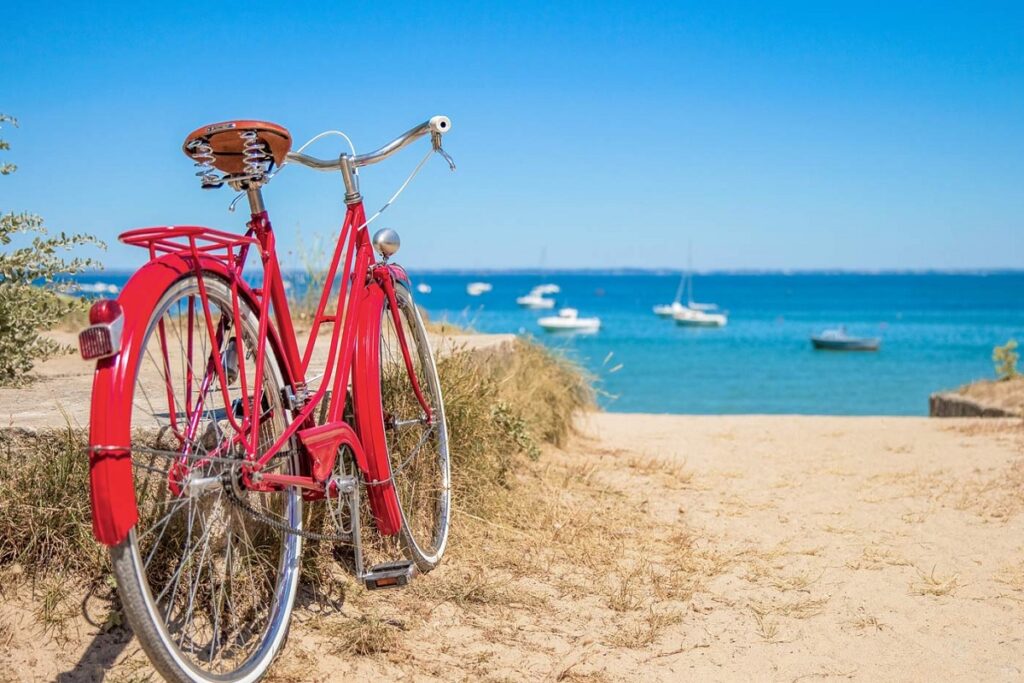
Île de Ré is all about nature, wellbeing, gastronomy, culture and heritage, and that’s what we like about it. The largest town, Saint-Martin-de-Ré, is very popular with tourists, but the surrounding towns are also very popular because they can be wilder and more authentic. To get around the island, it’s best to get on a bike: miles and miles of cycle paths have been laid to make the most of the scenery Ré has to offer, without polluting this corner of the ocean too much. As you cycle along, you’ll discover the Vauban fortifications around Saint-Martin-de-Ré, the Baleines lighthouse and the salt marshes. In the evening, regulars gather in their favorite spots. If you don’t want to find yourself surrounded by tourists, head away from Saint-Martin-de-Ré and you’ll find small restaurants where you can eat oysters and drink white wine far from the tourist hustle and bustle.
🛏️ Compare and book hotels in Île de Ré
🚌Bus journey: La Rochelle – Bordeaux (2h16)
🚘By car: La Rochelle – Bordeaux (2h04)
Bordeaux (2 nights)
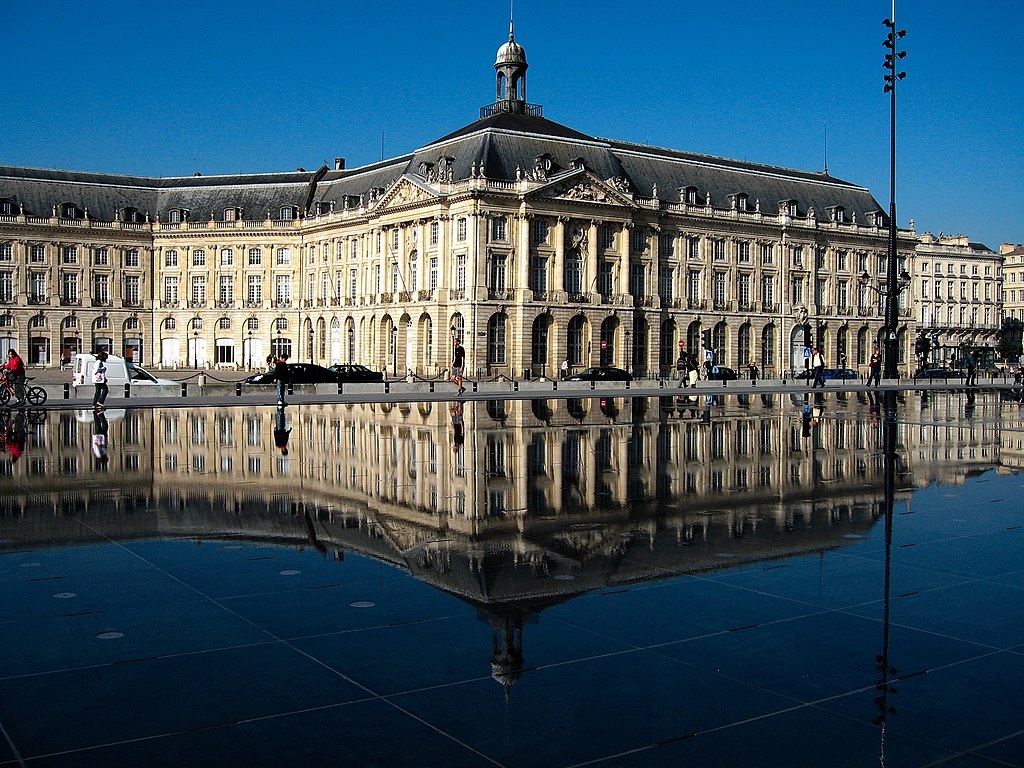
Bordeaux is famous for its wines and for being a student city, but it’s also one of the main French cities to visit if you’re spending two weeks in France. Two nights won’t be enough to visit this city and its surroundings, as it’s packed with must-see sites. Bordeaux is ideal at any time of year, even in summer, when students and locals usually leave the city. You can explore the city’s cultural, religious, industrial and environmental heritage, with its little-known monuments well worth a visit. If you like to party, you’ll find plenty to do with the casino, the many clubs and bars and the festivals that invade the city every year.
🛏️ Compare and book hotels in Bordeaux
🚌Bus journey: Bordeaux – Arcachon (55 min)
🚘By car : Bordeaux – Arcachon (1h)
🔗 Read Also: Best Things to do in Bordeaux
Dune du Pilat (Stopover)

Europe’s highest dune (110m) is a must-see if you’re in the region. From its summit, you’ll enjoy a panoramic view of sea and forest. During the day, you can enjoy views of the Arcachon Basin, the Landes forest and even the tip of Cap-Ferret. As soon as the sun begins to set, you’ll be treated to a colorful sunset from the heights of the dune. Enjoy this gift of nature, as it retreats year by year towards the forest…
🚆Train journey: Bordeaux – Toulouse (2h10)
🚘By car : Bordeaux – Toulouse (2h50)
🚆 Check Train Schedules & Prices
Toulouse (Stopover)
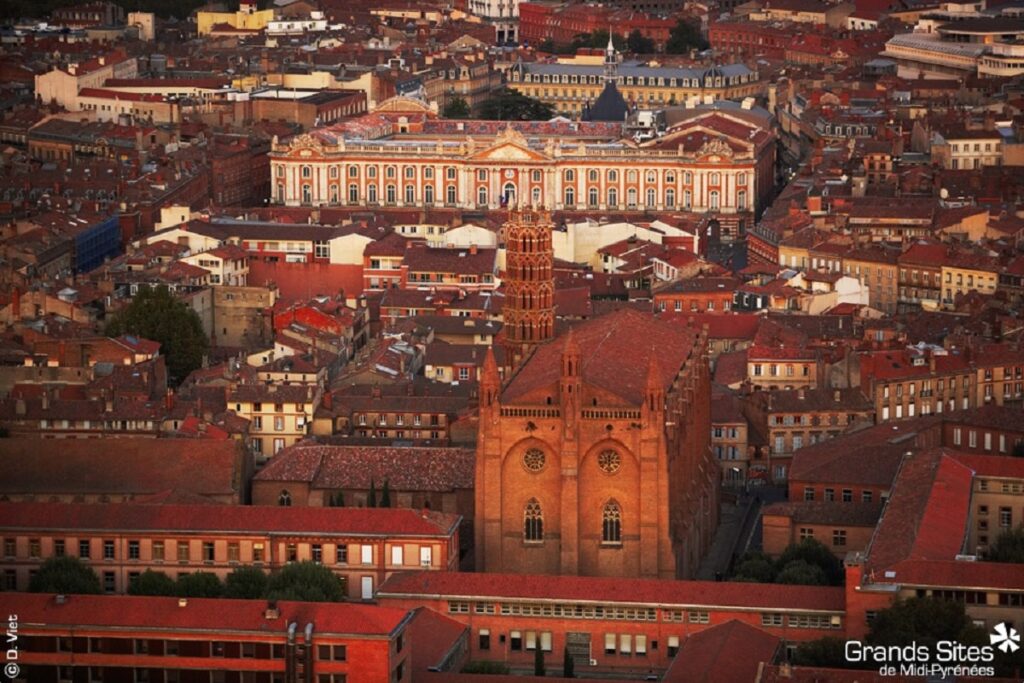
Toulouse, the pink city, the student city and the historic city! There’s a reason why the people of Toulouse are so proud of their city. Even in winter, the pink (and sometimes red) brick buildings add color to the city. You’ll always find something to do in this historic capital of Languedoc. As for the greenery, you can stroll along the banks of the Garonne, in the Jardin des Plantes or in the Jardin du Grand-Rond. Toulouse also has a rich historical heritage. To get to know this history, visit the Place du Capitole, the Basilique Saint-Sernin or the Abattoirs (museum of modern and contemporary art). Toulouse is a student city, so whatever the time of the week, you’ll find a bar open to party. All you have to do is choose when you want to go.
🛏️ Compare and book hotels in Toulouse
🚆Train journey: Toulouse – Montpellier (2h10)
🚘By car : Toulouse – Montpellier (2h30)
🚆 Check Train Schedules & Prices
Montpellier (1 night)

There aren’t many real Montpellier residents: many come here to work or study, but few are born and bred here. You won’t be disoriented by this flood of tourists, students and workers. But what to do in Montpellier? You can go out, of course – there’s no shortage of places to go with the student population – but you can also visit! If you wander around the city at random, you’ll always come across an interesting monument or place to see. Place de la Comédie is the city’s central square. This is the best place to start. From here, you can discover the Esplanade Charles-de-Gaulle, the Arceaux, the Place Royale du Peyrou and much more!
🛏️ Compare and book hotels in Montpellier
🚆Train journey: Montpellier – Marseille (1h50)
🚘By car : Montpellier – Marseille (2h)
🚆 Check Train Schedules & Prices
🔗 Read Also: 16 Best things to do in Montpellier for first time visitors
Marseille (1 night)

Marseille is famous for its accent, its Vieux-Port and its bouillabaisse, but it’s above all steeped in history, as it’s considered France’s oldest city. If you’d like to spend a pleasant stay in Marseille and enjoy this pretty corner of the south, we recommend you set down your suitcases in the city’s historic heart, the “Panier”. The Old Port, the Calanques, the Canebière and the remarkable Second Empire monuments are all worth a visit. Other more modern sites are also not to be missed, to observe this blend of the historic and the modern. The Cité Radieuse seems to be one of the most emblematic modern buildings. Stop off at a small restaurant to sample the region’s specialties (tapenade, bouillabaisse…), with a glass of pastis to soak up the Marseille sunshine.
🛏️ Compare and book hotels in Marseille
🚆Train journey: Marseille – Lyon (1h40)
🚘By car : Marseille – Lyon (3h07)
🚆 Check Train Schedules & Prices
🔗 Read Also: Best Things to do in Marseille
Lyon (2 nights)
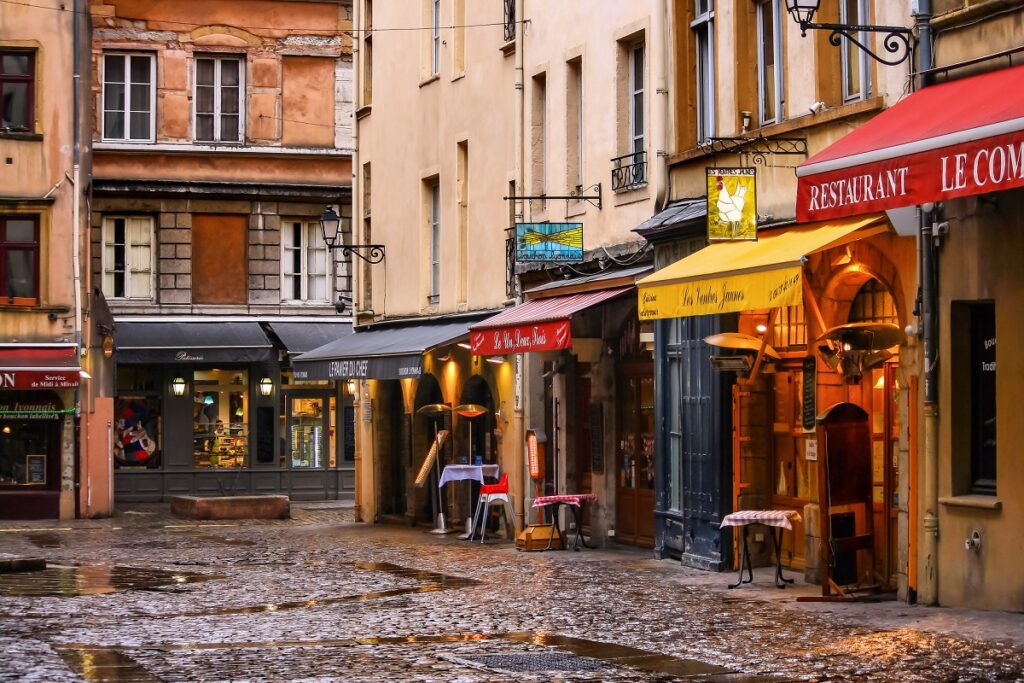
This city, located 3 hours from the sea and not far from the mountains, boasts a privileged geographical location, making it one of the most visited cities in France. In addition to this location, Lyon boasts one of France’s richest historical, cultural and environmental heritages. Walking in the greenery, shopping, strolling through authentic alleyways, this is what awaits you during your stay in Lyon. Vieux-Lyon and the Fourvière hill are among the must-sees if you’re short on time. For a gastronomic tour, Lyon sausage, quenelles or gratin dauphinois will delight your palate. As for the rest of the city, 236 monuments are listed as part of Lyon’s historic heritage, so you’re free to wander around and simply contemplate the buildings in front of you.
🛏️ Compare and book hotels in Lyon
🚆Train journey: Lyon – Dijon (1h22)
🚘By car : Lyon – Dijon (2h08)
🚆 Check Train Schedules & Prices
🔗 Read Also: 18 Best things to do in Lyon for first time visitors
Dijon (1 night)
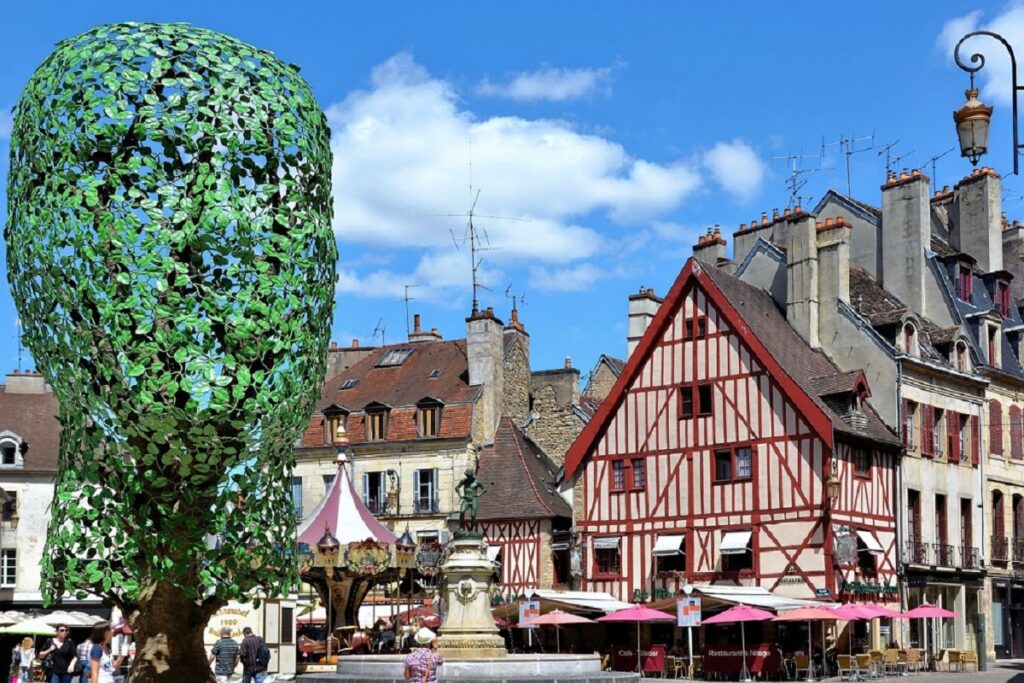
Dijon’s mustard is the talk of the town, but there are many other attractions. Primarily known for its gastronomy, Dijon is very popular with tourists. If you’d like to discover its specialties, there’s plenty to choose from: escargots, truffles, boeuf bourguignon, gougères and nonettes. The monuments are less famous, but are sure to surprise you. A mix of medieval and Haussmannian buildings, a little modernism and green spaces, Dijon has created a unique charm for itself. The rarity of modern buildings is explained by the fact that Dijon was one of the first cities to have its heritage protected. So you’ll find theaters, department stores, cinemas and libraries with all the trappings of yesteryear. An exceptional city in a country that’s constantly modernizing.
🛏️ Compare and book hotels in Dijon
🚆Train journey: Dijon – Colmar (1h43)
🚘By car : Dijon – Kaysersberg (2h53)
🚆 Check Train Schedules & Prices
🔗 Read Also: Best Things to do in Dijon
Kaysersberg (Stopover)
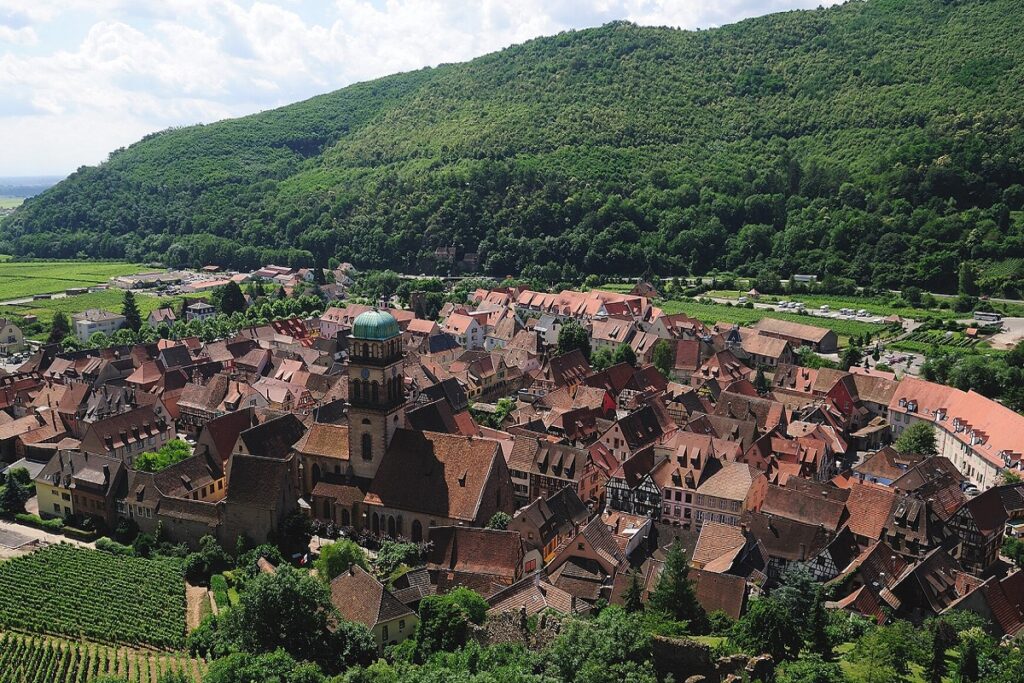
Kaysersberg is a little-known town, but one of the most beautiful in France. Its German countryside feel attracts well-informed visitors who want to discover the less urban corners of France. The town’s main religious buildings include the Eglise de Kaysersberg, three chapels, a former convent and a priory. Other sites that bear witness to the town’s past include the Hôtel de Ville, the fortified bridge and the Tour de la Porte Haute. But it’s the town itself that is an open-air museum, with the half-timbered houses that make up its greatest charm. Set in a valley, Kaysersberg is the ideal place to recharge your batteries and see France in a whole new way.
🚌Bus journey: Kaysersberg – Strasbourg (2h33)
🚘By car : Dijon – Kaysersberg (2h53)
Strasbourg (2 nights)

Located in the east of France, Strasbourg has not been forgotten. This border city with Germany is steeped in history, and this is reflected in its heritage. The city center, which is entirely listed as a UNESCO World Heritage Site, bears witness to the important traces of its past. In the center, you’ll find Strasbourg’s Notre-Dame Cathedral and the historic Petite France district. The city also boasts renowned national monuments such as the National Theater, the National Opera House and the National and University Library. Like most major French cities, Strasbourg is also a student city, where everything is done to ensure a festive atmosphere. You’ll have no trouble finding bars, events and, especially at Christmas time, markets to celebrate French-style.
🛏️ Compare and book hotels in Strasbourg
🚌Shuttle: Strasbourg – Strasbourg Airport (9 minutes)
🔗 Read Also: 12 Best things to do in Strasbourg for first time visitors
Budgeting for a Two-Week Journey Through France
When planning a two-week trip through France, it’s crucial to consider your budget carefully to ensure a smooth and enjoyable experience. France can cater to a wide range of budgets, from the frugal backpacker to the luxury seeker. Here’s a breakdown of the potential costs you might incur on the itinerary mentioned:
Accommodation
- Paris: As a major tourist destination, accommodation can range from $60 per night in a hostel to $200 and up for a mid-range hotel. For two nights, budget approximately $120-$400.
- Saint-Malo, La Rochelle, Bordeaux, Toulouse, Montpellier, Marseille, Lyon, Dijon, Strasbourg: Prices can be slightly lower than Paris, with hostels around $50 per night and hotels starting at $100. For each city, budget around $50-$200 per night.
Transportation
- Train Travel: The France rail pass or point-to-point tickets can vary greatly. A rail pass for two weeks could cost around $400-$500, while individual tickets will depend on the time of booking and the train type.
- Car Rental: If you prefer driving, a rental car could cost around $30-$50 per day, plus fuel.
Food
- Dining: On average, budget around $30 per day for casual dining, which amounts to $420 for two weeks. This can be reduced if you opt for picnics or street food.
- Fine Dining: For a taste of French gastronomy, set aside $100-$200 for at least one special meal.
Sightseeing
- Attractions: Many museums and attractions in France charge an entry fee of $10-$20. If you plan to visit multiple sites, consider city passes where available.
- Tours: Guided tours can enhance your experience, especially in historical areas. Budget around $30-$100 per tour, depending on the type.
Miscellaneous
- Shopping: Souvenirs and shopping can add up, so set a budget that suits you.
- Emergencies: Always have a contingency fund, approximately 10% of your total budget.
Estimated Daily Budget
- Budget Traveler: $100-$150 per day
- Mid-Range Traveler: $200-$300 per day
- Luxury Traveler: $400 and up per day
Total Estimated Cost
- Budget Traveler: $1,400-$2,100 for two weeks
- Mid-Range Traveler: $2,800-$4,200 for two weeks
- Luxury Traveler: $5,600 and up for two weeks
These estimates are based on average costs and should be adjusted based on personal travel style, the current economic situation, and actual prices at the time of booking. Always check for updated prices and consider booking in advance to secure the best deals. Remember that traveling off-season can also significantly reduce costs.
When to Embark on Your Two-Week Itinerary in France
Embarking on a two-week journey through France promises an array of experiences, from the romantic streets of Paris to the historic sights of Mont Saint-Michel and the culinary delights of Lyon. However, the time of year you choose to visit can profoundly affect your experience. In this guide, we’ll explore the best time to travel to France, ensuring you can fully enjoy every step of your meticulously planned itinerary.
The Best Time to Visit France for Weather and Crowds
- Spring (April to June): Spring in France is a time of renewal and vibrant color, with moderate temperatures and fewer tourists. It’s the perfect season for strolling through Paris or enjoying the coastal beauty of Saint-Malo and La Rochelle. The weather is generally mild, with occasional showers, so packing a light raincoat is advisable.
- Summer (July to August): French summers are famous for their warmth and sunshine, making it a peak season for tourists. While you’ll find the best weather for beach days in Marseille and Montpellier, be prepared for larger crowds and higher prices. Early booking is essential to secure accommodation and the best rates.
- Fall (September to November): Autumn brings a magical palette of colors to the French countryside, cooler temperatures, and the grape harvest season, particularly enticing for Bordeaux. The tourist crowds start to thin out, allowing for a more relaxed exploration of Toulouse, Lyon, and the charming Alsace region.
- Winter (December to March): Winters can be cold, but the charm of Christmas markets in Strasbourg and the possibility of lower travel costs make it an attractive option for budget travelers. Paris in the off-season offers a unique atmosphere, though some attractions in other regions may be closed or have limited hours.
🔗 Read Also: 1-week South of France Road Trip Itinerary: Marseille, Arles, Avignon & More
Aligning Your Travel with France’s Cultural Calendar
- Festivals and Events: France’s cultural calendar is bustling with events. Time your visit to coincide with the Cannes Film Festival or the Nice Carnival for a touch of French glamour and festivity.
- Public Holidays: Be aware of national holidays like Bastille Day on July 14th, when you can witness spectacular fireworks and celebrations, especially in Paris.
Choosing the right time to visit France can transform a good trip into an unforgettable journey. Whether you’re after the bustling city life of Paris and Lyon, the serene beaches of the French coast, or the historic wonders of Mont Saint-Michel and Strasbourg, timing is everything. Consider your preferences for weather, crowds, and local events to determine the best period for your travel, and you’ll be set for an extraordinary French adventure.
Transportation Tips: How to Travel Between Cities in France Efficiently
Embarking on a two-week journey through the picturesque locales of France requires not just a sense of adventure but also a savvy understanding of the local transportation options. In this section, we’ll delve into the most efficient and enjoyable travel methods to move between the destinations on your French itinerary, ensuring your journey is as smooth as the fine wines of Bordeaux.
Embracing France’s Efficient Rail Network
Train Travel: France’s pride is its extensive and efficient rail network, primarily operated by SNCF. The high-speed TGV (Train à Grande Vitesse) and intercity trains connect major cities like Paris, Bordeaux, and Lyon, making it an ideal choice for travelers looking to maximize their sightseeing time. For instance, after exploring the romantic streets of Paris, you can reach Mont Saint-Michel and Saint-Malo via a combination of TGV and regional trains, immersing yourself in the scenic landscapes along the way.
- Booking Tips: Reserve your train tickets in advance, especially for TGV routes, to avail of early-bird rates and ensure seat availability.
- Rail Passes: Consider purchasing a France Rail Pass if your itinerary involves multiple train journeys, offering flexibility and potential savings.
The Charm of Road Trips
Car Rentals: For those who crave spontaneity and the freedom to explore off-the-beaten-path villages, renting a car is the way to go. The drive from La Rochelle to the vineyards of Bordeaux or the historic streets of Toulouse can be as captivating as the destinations themselves.
- Scenic Routes: Take the coastal roads from Saint-Malo to La Rochelle or the countryside routes through the heart of France to Dijon for an unforgettable experience.
- Parking and Traffic: Be mindful of parking regulations in cities and anticipate traffic during peak tourist seasons.
The Convenience of Intercity Buses
Bus Services: Intercity buses offer an economical alternative to trains and cars, with companies like FlixBus and Ouibus providing comprehensive networks across France. While the journey may take longer, the cost savings can be significant, especially for budget travelers.
- Planning: Check bus schedules in advance and be prepared for longer travel times, which can be a trade-off for lower prices.
The Speed of Domestic Flights
Air Travel: For those short on time, domestic flights can whisk you from Paris to cities like Marseille or Toulouse in just over an hour. While not the most cost-effective or environmentally friendly option, it’s worth considering if you’re pressed for time.
- Advance Booking: Flight prices can spike closer to the departure date, so book early to secure the best deals.
Local Transportation: The Final Leg of Your Journey
Public Transit and Taxis: Upon reaching each city, take advantage of the local public transportation systems, which are generally reliable and affordable. Taxis and ride-sharing services are also available for more direct travel to your accommodations or attractions.
As you plot the course from the iconic Eiffel Tower to the quaint streets of Strasbourg, consider how each mode of transportation can enrich your journey. Whether you’re marveling at the French countryside from the comfort of a train or enjoying the flexibility of a car rental, each option offers its own unique set of benefits. Plan wisely, and you’ll find that getting from one city to the next can be just as memorable as the destinations themselves.

